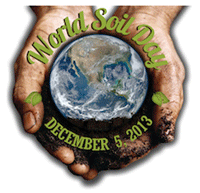 Got soil? Go outside and dig your fingers in it. It’s World Soil Day!
Got soil? Go outside and dig your fingers in it. It’s World Soil Day!
Here’s a message from USDA’s Natural Resources Conservation Service on how important healthy soil is and how using conservation practices like no-till can help farmers take better care of their land.
When soil is heavily tilled, the stalks from the previous crop are chopped, and the top several inches of soil structure are disturbed. Conventional thought suggests this fluffing action allows for better seed placement, but Ray Archuleta, NRCS conservation agronomist, said that no-till systems, especially when combined with cover crops, are better – and lead to healthier, more drought-resistant soil.
Archuleta, who works at the agency’s East National Technology Center in Greensboro, N.C., said no-till has significant financial benefits for producers, too.
“No-tillage can save thousands of dollars every year in fuel, labor and equipment maintenance,” Archuleta said. “The key is to let the soil organisms do the work.”
Here’s a message from the FAO and the Global Soil Partnership.
